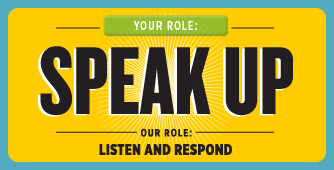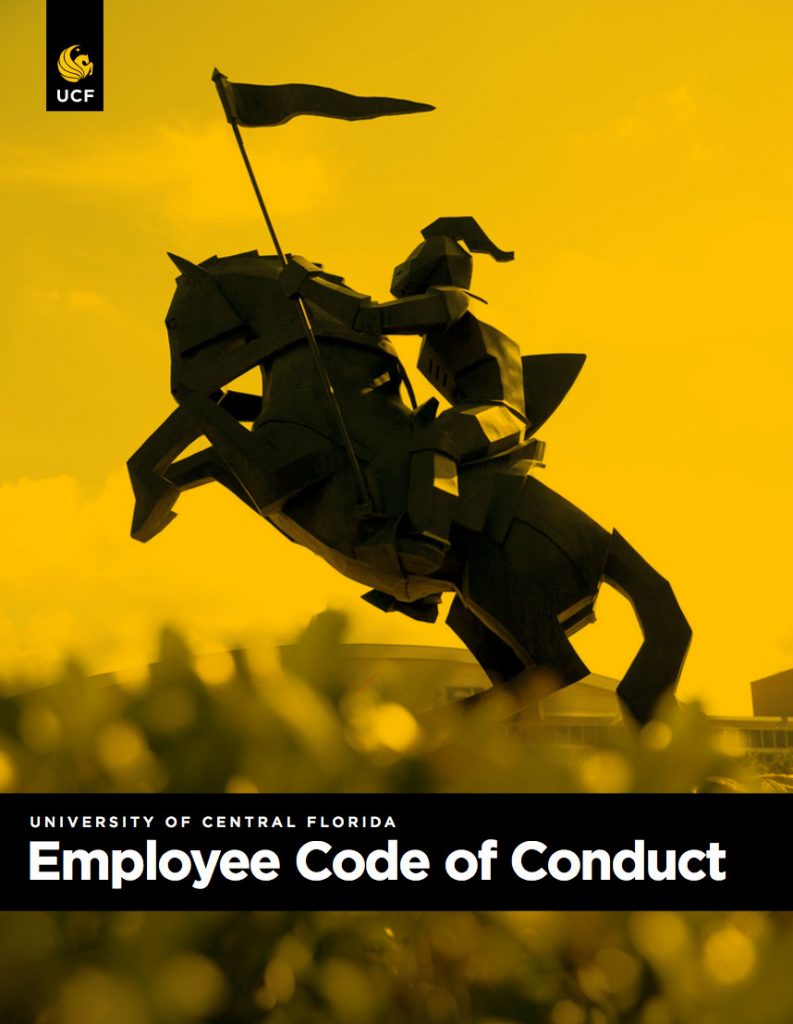 UCF Compliance & Ethics Newsletter
UCF Compliance & Ethics Newsletter
FAQs
In each IntegrityStar edition, we highlight some frequently asked questions. In this 14th edition we offer the following questions and answers regarding plans and updates on returning to campus. These FAQs provide general guidelines for all employees based on return to campus updates received as of the publishing of this newsletter. This information is subject to change with the introduction of additional public health guidelines from local, state, and federal authorities. Please check the university’s Emergency Policy on COVID-19 Return to Campus for the most up to date information.
What are the requirements for employees working on campus?
For those employees who will continue or return to work on campus, the following apply:
- All employees coming to campus to perform work must complete the required training course that provides a general overview of COVID-19 prevention and control measures and campus-specific policies prior to returning to campus. If the training course is substantially revised or if there is an identified need for it, some or all employees may be asked to retake the training.
- Employees coming to campus for work or other purposes must complete UCF’s symptom-checker each day that they come to campus. The symptom-checker may be accessed through the UCF Mobile App (a free application available for download from the Apple App Store or Google Play) or through the online version available at https://ucf.service-now.com/self_checker. Either way, if an employee answers YES to any of the screening questions, the employee should not come to campus. Complete the symptom-checker even if just coming to campus for a short time, for example to pick up something from the office, and even if not intending to stay on campus the entire workday.
- Face coverings are required to be worn in all indoor common spaces with other people present (e.g., classrooms, common work or living spaces, meeting rooms, etc.); all enclosed spaces with other people present (e.g., campus vehicles, UCF shuttles, etc.); and indoors and outdoors. Exceptions to the face covering requirements are noted in the Emergency Policy EP-20-2 COVID-19 Return to Campus Policy.
- It is an employee’s responsibility to have a facial covering when on campus. If an employee comes to campus without a facial covering, the employee must obtain a disposable mask or some other facial covering. Disposable masks will be available for sale on campus and may be available at different distribution points across campus. Also, some departments may have disposable masks available for their employees and office visitors.
- Employees should wash their hands frequently and thoroughly, and encourage it of others.
- Meetings should continue to occur in virtual platforms (e.g., Skype, Teams, Zoom, etc.), as much as possible. If an in-person meeting is necessary, the meeting organizer must structure the meeting to follow space capacity limits, physical distancing, and other health measures.
- Managers and supervisors should coordinate workplace furnishings and activities to allow at least 6 feet between workers, or between workers and other persons like contractors or visitors. This also applies to shared offices without partitions, break rooms, conference rooms, etc. Cubicles with wall partitions of less than six feet in height will also require six feet between workers. Employees are expected to follow physical distancing expectations and requirements.
- Employees should follow respiratory etiquette, including covering coughs and sneezes.
- Employees should avoid using other workers’ phones or share desks, offices, or other work tools and equipment, as much as possible.
- Employees should frequently sanitize shared office equipment like photocopy machines, fax, and scanners, among other things.
- Clean touchpoints within office suites or departments frequently, including breakrooms, copiers, and shared spaces.
- Avoid office gatherings, break rooms, and unnecessary visitors in the workplace.
- Employees may be required to return to remote work at any time and are required to cooperate if directed to do so.
What if I am unable to access the COVID Self-Checker through a smartphone or UCF Mobile app?
You can access the COVID Self-Checker online at ucf.service-now.com/self_checker, or a paper form is currently available in English and Spanish on Human Resources’ website.
What is the notification process if there is a possible COVID-19 exposure at UCF?
If a known exposure event occurs at UCF, the department should notify Environmental Health & Safety at 407-823-5223 regarding the known exposure event. The department should be prepared to identify to the best of its ability: when the known exposure event occurred, who was present at or near the time of the known exposure, who was the catalyst of the known exposure, and what steps the department has taken at that point. The department should not attempt to clean the worksite space on its own – Environmental Health & Safety will take lead in assessing the cleaning and disinfecting needs for the area and arrange for services as needed.
If you are a supervisor and someone in your office (whether an employee, a volunteer, or a vendor/contractor) tests positive for COVID-19:
- Require that individual to stay home and not return to work until cleared to return.
- Require that individuals who had close contact with the employee (more than 15 minutes, within 6 feet, over the past 14 days) not return to work until they receive further guidance from their healthcare provider.
- Contact the UCF COVID Line at 407-823-2509 to coordinate contact tracing and the assessment of disinfecting needs in collaboration with Environmental Health & Safety.
Take other steps as appropriate based on the situation to minimize potential exposure to others (examples could include posting additional signage, etc.). Supervisors will need to make assessments on a case-by-case basis and can contact Human Resources for additional guidance.
When should someone need to quarantine vs isolate?
Quarantine is used to keep someone who might have been exposed to COVID-19 away from others. Quarantine helps prevent spread of disease that can occur before a person knows they are infected or if they are infected with the virus without having symptoms. People in quarantine should stay home, separate themselves from others, monitor their health, and follow directions from their healthcare provider, or a public health official/office that advised the person to quarantine.
Quarantine Following Close Contact
A person should quarantine when they have been in close contact with someone who has COVID-19. This includes people who previously had COVID-19 and people who have taken a serologic (antibody) test and have antibodies to the virus. Close contact means any of the following applies: you were within 6 feet of someone who has COVID-19 for at least 15 minutes; you provided care at home to someone who is sick with COVID-19; you had direct physical contact with the person (touched, hugged, or kissed them); you shared eating or drinking utensils; or they sneezed, coughed, or somehow got respiratory droplets on you. The CDC recommends that a person quarantine for 14 days after close contact as defined above and monitor their symptoms. See the CDC’s guidance for more information.
Isolate if Sick or Infected with the Virus
Isolation separates people who are infected with the virus away from people who are not infected. People who are in isolation should stay home until it’s safe for them to be around others, except to seek medical care. In the home, anyone sick or infected should separate themselves from others by staying in a specific “sick room” or area and using a separate bathroom (if available). For more information about isolation and when a person can end their isolation, see the CDC’s guidance on isolation.
How will the requirements of the Emergency Policy on COVID-19 Return to Campus be enforced?
All employees, students, visitors, vendors, volunteers, contractors and contractor employees must comply with the instructions given to them as to when they are to return to campus. The success of the university’s COVID-19 response depends on the compliance and cooperation of every individual who comes to campus. The goal of the university is that all members of the university community and all other persons on campus will voluntarily comply and cooperate with the policy. In most instances of a violation of the policy, the university will seek compliance first through education and repeated training. Repeated acts of non-compliance will result in the individual’s removal from campus until compliance is achieved. Continued non-compliance may result in a more severe response – specifically, disciplinary action for faculty, staff members, and students, up to and including separation from the university; removal from campus, including trespass orders as necessary, for visitors who refuse to comply with the university’s policy. Contractors and contractor employees who fail or refuse to comply with the university’s policy may be asked to leave the university, may be in breach of contract, or may be trespassed from the university if non-compliance continues.
Not all violations of the policy are the same. An instance of failing to wear a mask or not performing the daily symptom screener may be a matter of forgetfulness or miseducation that can be corrected with a reminder or retraining. However, reporting to campus for work or classes knowing that one is COVID-19 positive and has not been released to return to normal activities by a healthcare provider is an egregious policy violation that directly endangers others and may result in substantial disruption and/or cost to the university. The university reserves the right to respond immediately and at the highest level to blatant and intentional policy violations. This response may include substantial disciplinary action (up to and including termination) and/or removal of the individual from the campus (up to and including with the issuance of a trespass order).


